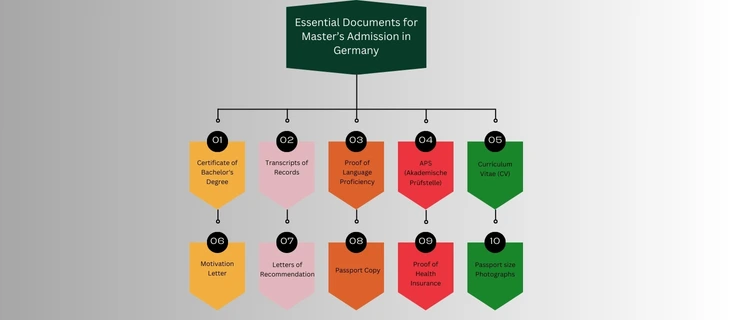Germany has emerged among the top nations for MS from India students owing to excellent education, very advanced research facilities, and generally low or no tuition fees for MS programs. Considering the size of its economy, Germany becomes a country with brilliant job opportunities after graduation from MS in any field, engineering, IT, or sciences-related areas. Curious about how to get admission in Germany for MS from India, the eligibility criteria, the application process, scholarships, and all aspects of the visa? Our detailed guide will empower you with all the information you need.
Overview of the German Higher Education System
There are over 400 higher education institutions, including universities, Technical Universities, and applied sciences universities in Germany. MS in various disciplines such as engineering, computer science, biotechnology, physics, and economics is offered in the country, and there is a fair range of options.
If you are wondering how to get admission in Germany for MS from India, It’s essential to understand the educational landscape. German universities are divided into two types:
- Public Universities: The most public universities either charge negligible or no tuition fees, which makes them famous for international students. Education here is mainly research-based.
- Private Universities: Private universities mostly charge a higher fee than that of public universities, but offer special courses, even in certain circumstances with reduced admission criteria.
Eligibility Criteria for MS in Germany
Understanding the eligibility criteria is the first step towards accessing MS in Germany. Even if the specific requirement varies from university to university, the general requirement holds good almost everywhere, such as mentioned below:
- Bachelor’s Degree: A bachelor’s degree from the relevant stream or equivalent qualification for an MS in the concerned field is required. The German universities ask for at least 60-70% aggregate marks or a CGPA score of 6.5 – 7.0 out of 10 from the bachelor’s degree. Universities often request that students participate in a bridge program or other related prerequisites to make up for that missing year that every student in countries other than the United States has had to complete a three-year bachelor’s degree.
- Language Proficiency:
There are MS programs offered at German universities in both languages, English and German. You have to conduct the study either in English or German.
For the English program, you must present a certificate of your proficiency in the language. Such certificates can be given by standardized tests, for instance, TOEFL (min. 80–100) or IELTS (min. score 6.5–7.0).
While for German, you will need to take one of the language proficiency tests, TestDaF or DSH.
- GRE/GMAT: GRE scores are not always required. There might be some technical MS programs like in Mechanical Engineering, Computer Science or Electrical Engineering which require this. Similar will also be with the management-related programs like MS in Business Analytics or Supply Chain Management which might require a GMAT score. A good score in GRE or GMAT always helps a lot to an application especially when the academics are not so great.
Competitive programs: Target at least 310+ GRE and 650+ GMAT
- Work Experience: Most programs in MS do not require any relevant work experience but are seen as adding strength to your application. Technical programs in a number of fields, such as data science, business analytics, and engineering management, are likely interested in professional experience because this experience complements the practical knowledge that you will bring to the classroom.
Tip: Discuss how your work experience prepared you for graduate study again taking into consideration your goals.
- GPA/Academic Performance: Most of the German universities require a minimum GPA range of 6.5 to 7.5 on a scale of 9.0, contingent upon the program taken. A good academic record enhances your opportunities for getting selected.
Selecting the Right University and Program
When considering how to get admission in Germany for MS from India, it’s important to choose the right university and program. Where you go for academics and subsequently will work is very much important. You should research and choose the best opportunity for your MS in Germany as per below:
- Research Universities: Research the DAAD (German Academic Exchange Service) database and other sites such as Mastersportal, which give detailed information on universities and MS programs. Find universities with a higher ranking in your field of study and strong industry connections for internship and job opportunities.
- Program Structure: Evaluate the structure of the course, specializations available, and the research work one can do within the framework of the program. Ensure that the course structure accommodates your career orientation. You may also opt for a research-focused or application-focused course.
- Location: Germany is an extensive country with a number of cities ranging from Berlin, Munich, and Frankfurt, to Hamburg. When deciding a location to study at, keep in mind a number of living costs, climate, and job prospects.
- Accreditation: That the university or program is accredited and recognized globally. Most public universities in Germany are recognized, but it is always wise to cross-check.
Application Process for MS in Germany
Once you have shortlisted your universities, the next step is to begin the application process. By following our step-by-step instructions, you can discover how to get admission in Germany for MS from India with ease.
Application Timeline
Each university in Germany has different deadlines. German universities normally have two intake periods.
- Winter Semester: Start in September/October. Normally applications will be accepted between May and July.
- Summer Semester: Start in March/April. Normally applications will be accepted between December and February.
Submit the Required Documents
Most universities require the following documents:
- Completed Application Form
- Academic Transcripts
- Statement of Purpose (SOP)
- Letters of Recommendation (LORs)
- APS
- CV
- Language Proficiency Test Scores
- Passport Copy
- GRE/GMAT Scores (if applicable)
Apply via Uni-Assist or University website
The German universities can be accessed either through the Uni-Assist application platform or directly through their websites. Check if your chosen university accepts applications through Uni-Assist. If they do, then you’ll have to register on their site, submit your documents, and apply. There are some universities, particularly the state universities that accept direct applications.
Application Fee
Universities typically charge a non-refundable application fee that ranges from EUR 50 to EUR 100. Make sure to submit the fee on time, as unpaid applications won’t be considered.
Attend Interview (if required)
Some competitive MS programs-private university –you have to take an online interview or do a video submission. Most of the time, this is your opportunity for them to check the level of interest and communication skills you have.
Wait for the Admission Offer
Normally, it takes only a few weeks or months after the application submission to receive the admission offer (Zulassungsbescheid) from the university, provided your application was successful.
Accept the Offer and Pay the Semester Fee
Then, after receiving the admission offer, accept it by paying a semester fee between EUR 100 and EUR 300. The fee includes administrative costs, and you are allowed to use mainly subsidized student advantages in respect of public transport, health insurance, and membership fees in the university Gyms.
Apply for a German Student Visa
You would be required to make an appointment at the nearest consulate or embassy and apply for the visa with all your documents. Make sure to present the following:
- Your passport
- Admission letter.
- Blocked account of about EUR 11,208 (Around 10 lakhs in Indian rupees) showing that this sum is sufficient to cover all living costs for the entire period of one year.
- Health insurance
- Required documents
- Language proficiency proof of the applicant
Essential Documents for Master’s Admission in Germany
Finding out how to get admission in Germany for MS from India can open doors to numerous academic and professional opportunities. Here are some documents you should prepare if you are pursuing or planning to pursue a master’s degree in Germany.

- Certificate for Bachelor’s Degree
This is a MUST-HAVE from a known university in a field relevant to the course to be undertaken. This paper will confirm that you have attended college and will form an integral part of your application.
- Transcripts of Records
Official Transcript showing performance in Bachelor’s studies with course taken, grades received and credits accrued at the end.
- Proof of Language Proficiency
If taught in English: TOEFL, IELTS, or equivalent
If taught in German: DSH, TestDaF is required.
- APS (Akademische Prüfstelle)
The APS (Akademische Prüfstelle) is an institution set up by the German government in various countries, including India, to evaluate academic qualifications for students wishing to study in Germany.
- Curriculum Vitae (CV)
A detailed resume indicating your education profile, working history, and/or internships, research you have conducted, skills that you have acquired, and any relevant extra-curricular activities.
- Motivation Letter
A well-structured letter explaining why you are looking forward to the specific Master’s course and your academic interest in it, what your career goals are and what you could gain from this particular course that would help you achieve your aspirations.
- Letters of Recommendation
Usually, two to three letters of recommendation from professors or professionals who can testify about your capabilities, personality, and potential as a graduate student.
- Passport Copy
A valid passport which must stay valid for the entire period of your stay in Germany.
- Application Form
Most institutions demand that you fill out an online application form sometimes requiring you to create an account at their application portal.
- Proof of Financial Resources
Proof showing that one can provide himself/herself with the requirements for sustenance while studying. Some of the proofs required are
Bank statements, A blocked account (Sperrkonto) showing that there is a sufficient amount of money present e.g. around EUR 11,208 to cover one year in 2024, and Letters of Scholarship or Eligibility for Sponsorship-if applicable.
- Proof of Health Insurance
That student is the right of German residents to have health insurance
- Portfolio(if applicable)
If it is a study program in the creative fields of design, art, architecture etc; then applicant’s work must be presented through a portfolio.
- Passport size Photographs
These are passport-sized photos needed by universities when applying, taken as per their specifications.
- Additional Supporting Documents (if required)
There might be additional prerequisites which are program- or even institutional-specific. These can include:
- Test scores in such standardized tests as GRE, GMAT, SAT, etc., a research proposal for programs with research methodology.
Important Information
- Check University Requirements: While one should check the prerequisites on the university’s website, specific documentation varies from one university to another.
- Translation of Documents: In case you have documents in any language other than German or English, then it calls for translation and it should be an official translation.
- Application deadlines: Keep track of application deadlines so that you do not miss the deadline by when documents should be submitted.
Conclusion
Admission to the MS program from India in Germany requires rigorous research, a very strong application, and planning. Understanding the process of how to get admission in Germany for MS from India is essential for aspiring students. Germany with affordable education coupled with the best universities in the world and great job opportunities is a great destination for students from India. The steps above are followed and therefore heighten your chances of gaining admission to make that dream you have studied to be a true reality.
Related Post
German language jobs salary in India
Best Studienkolleg in Germany
Intakes in Germany
Benefits of German Language













